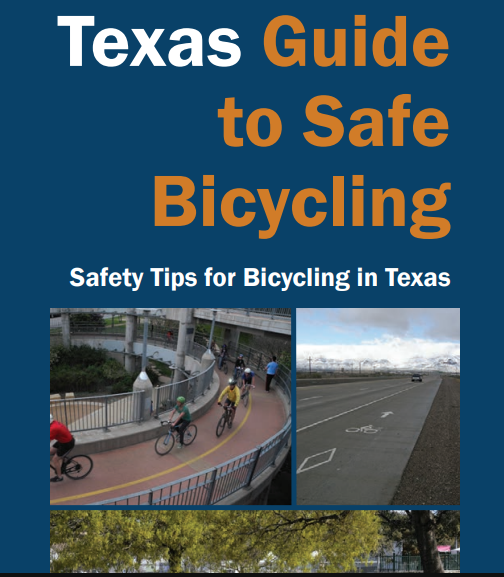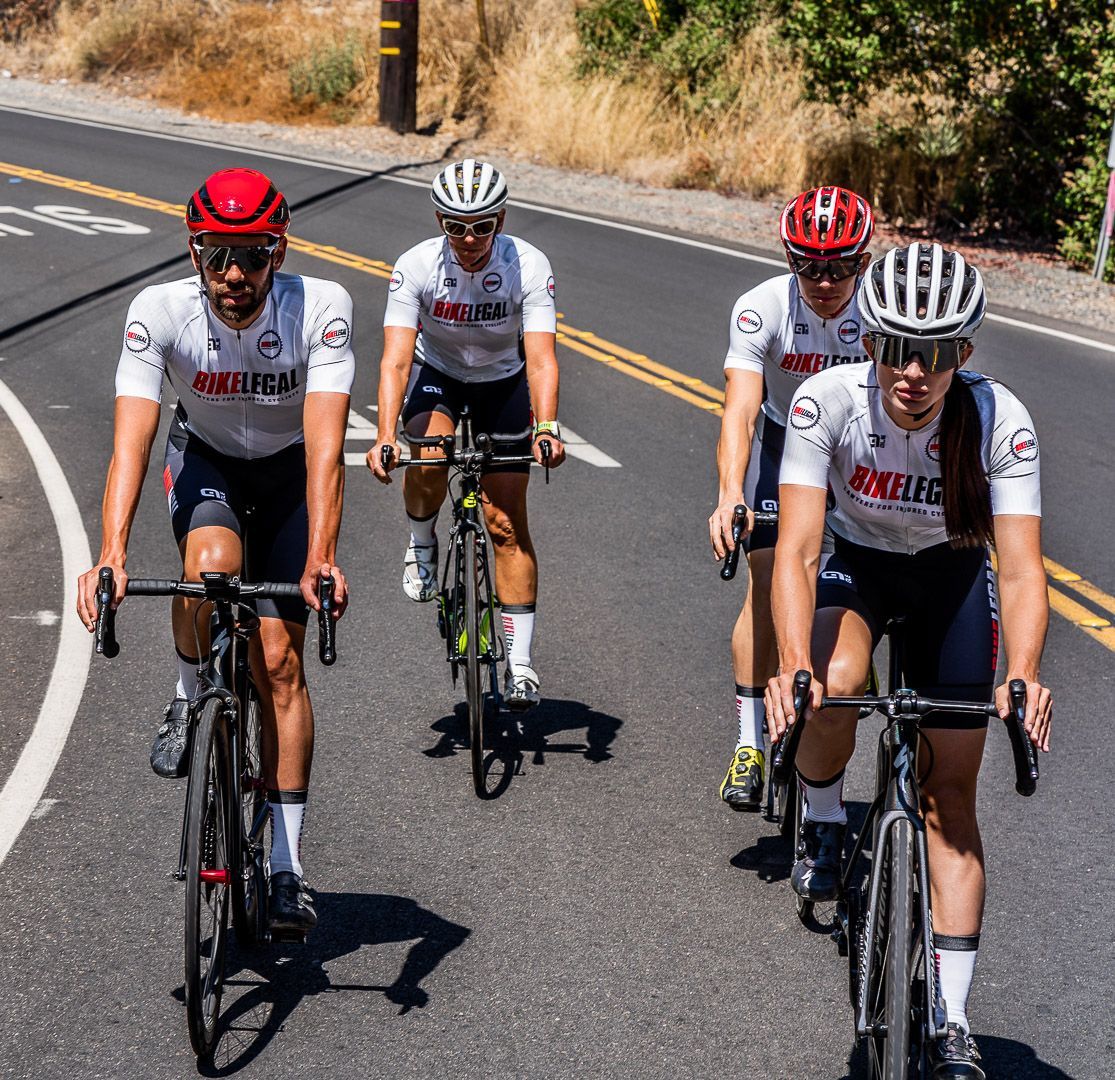Texas Bicycle Accidents: Stats, Laws, & Tips
Follow us on
social media!
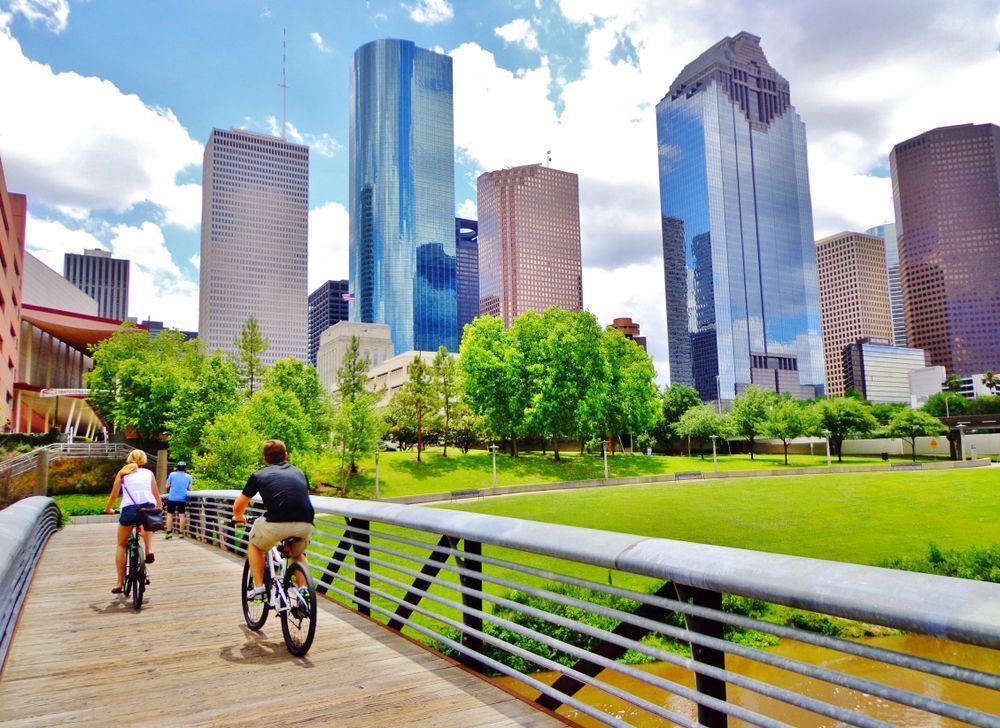
Welcome to your essential guide on bicycle safety and laws in Texas. As a cyclist in the Lone Star State, staying informed is key to your safety on the roads. From the latest accident statistics to understanding Texas cycling laws, this guide covers everything you need to know.
Additionally, cyclists must be aware of their rights and resources available, especially in the event of an accident. Exploring legal protections and support for cyclists in Texas can be a vital part of your safety toolkit, equipping you with the knowledge to navigate the roads confidently and securely.
This guide covers the following points:
- Pros of Cycling in Texas: Benefits like scenic routes, community support, and eco-friendly cycling opportunities.
- Challenges for Cyclists in Texas: Issues like busy traffic, variable road conditions, and inconsistent cycling safety laws.
- Bicycle Accident Statistics: Recent trends and statistics on bicycle accidents in Texas.
- Cycling Safety Ranking in Texas: Texas' position in national safety rankings and category-wise performance.
- Safe Cities for Cyclists in Texas: Safety rankings of Texas cities for cyclists, with a focus on top-performing areas.
- UM/UIM Coverage Necessity in Texas: Importance of UM/UIM coverage in Texas.
- Detailed State Bicycle Laws: Specific laws relevant to cyclists in Texas, such as safe passing and nighttime riding rules.
- Cycling Advocacy in Texas: Role of state and local advocacy groups in promoting cyclist rights and safety.
- Post-Accident Steps for Cyclists: Essential steps to take following a bicycle accident in Texas.
- Role of Bicycle Accident Attorneys: Importance of specialized legal representation in cycling accidents.
Pros of Cycling in Texas

Texas offers a treasure trove of benefits for cyclists. With its unique landscapes and robust cycling communities, the state is more than just a network of roads; it's a cyclist's paradise.
- Scenic Routes Galore: Texas offers a variety of picturesque cycling routes, each providing a unique view of the state’s diverse landscape. Whether it's exploring the historic Mission Trail in San Antonio or tackling the challenging terrain of the Davis Mountains in West Texas, cyclists have ample opportunities to experience the natural beauty of the area.
- Thriving Local Communities: In Texas, cycling is a communal affair. Organizations like Bike Austin and the Houston Bicycle Club provide platforms for cyclists to connect and engage. They offer group rides, workshops, and advocacy opportunities, fostering a strong sense of community.
- Focus on Health and Fitness: The wide-open spaces of Texas are perfect for maintaining an active lifestyle. The state's varied terrain allows for different levels of cycling, from leisurely rides along the San Antonio River Walk to more rigorous trails in the Palo Duro Canyon.
- Eco-Friendly Transportation: Texas cities are increasingly embracing bike-friendly infrastructure, like Austin, Houston, and San Antonio, promoting cycling as a sustainable mode of transport. This shift helps reduce urban congestion and pollution, contributing to a healthier environment.
- Support for Young Cyclists: Texas offers a range of programs and initiatives such as the Bike Legal Junior Cycling Grant Program aimed at encouraging young cyclists. These programs often provide training, equipment, and opportunities for competitive participation, helping to cultivate a new era of cycling enthusiasts.
Moreover, understanding the legal rights of cyclists in Texas can greatly benefit them in several ways. Firstly, it enhances their safety on the road. By knowing the laws applicable to cyclists, they can navigate roads more confidently, ensuring they are riding legally and safely.
Cons of Cycling in Texas
While Texas offers a great environment for cyclists, there are certain challenges that riders face in the Lone Star State.
- Busy Traffic: Texas' bustling urban centers like Houston and Dallas are known for heavy traffic, which can be daunting for cyclists, especially during peak hours.
- Varying Road Conditions: From rural to urban areas, road conditions in Texas can be inconsistent. Cyclists often encounter roads that aren't well-maintained or lack proper signage, making rides less smooth and potentially more hazardous.
- Limited Bicycle Infrastructure: Despite improvements in some cities, many areas in Texas still lack dedicated bike lanes and trails. Places like Corpus Christi and Laredo have fewer bike lanes and trails, posing challenges for cyclists to navigate safely alongside vehicles.
- Cycling Safety Laws: Texas is progressing in cycling safety laws, but there's still room for improvement. Laws that specifically enhance the safety of cyclists, like stringent rules for passing bikes and helmet requirements, are not uniform across the state.
Remember, awareness and preparation can help cyclists enjoy their rides while staying safe. By being aware and prepared, cyclists can navigate these challenges and enjoy the diverse landscapes Texas has to offer.
Bicycle Accident Statistics in Texas
The popularity of cycling in Texas has soared, but so has the risk associated with it. Understanding the state's bicycle accident statistics offers crucial insights into the safety landscape.
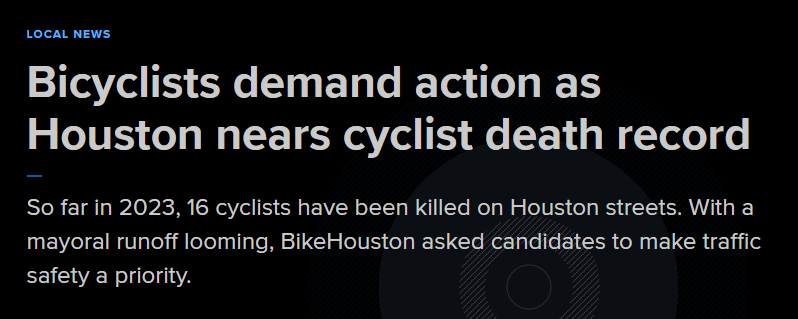
- Houston is on the verge of breaking a 10-year-old record in cyclist deaths. In 2023, there were more than 16 bicycle accident fatalities.
- The data from the Texas Department of Transportation reveals that in 2022, there were 2,347 bicycle accidents in the state.
- A 37% nationwide increase in cycling trips since 2019 reflects a growing trend, and Texas is no exception, with at least a 25% rise. This surge calls for enhanced safety measures.
- In 2020, a report from the Consumer Product Safety Commission highlighted that bicycles were involved in 425,910 emergency room visits, encompassing both accidents and intentional injuries.
- A 2021 study by Arris Composites found that Texas is one of the least bike-friendly states. Houston, in particular, was rated as the least bike-friendly city, considering factors like weather, accident statistics, and infrastructure.
These statistics not only highlight the risks but also emphasize the need for both cyclists and drivers to be more aware and proactive about safety on the roads.
Safe State Ranking for Cycling in Texas

On the leaderboard for cycling safety, Texas' ranking reflects a blend of achievements and challenges:
- National Ranking: In the 2022 League of American Bicyclists' rankings, Texas sits at the 32nd spot, suggesting that while there are efforts towards enhancing cycling conditions, there is still a considerable gap to bridge for safety improvements.
- Category Scores: The state's dedication to cyclist education and encouragement earns a 'C+' mark, while infrastructure and funding are ranked a 'C'. Despite these efforts, Texas scores a 'D-' in traffic laws & practices, hinting at areas that demand immediate attention for cyclists' safety.
- Policies and Planning: On a brighter note, Texas has done relatively well in formulating supportive policies and programs, receiving a 'B+', and in its strategic evaluation and planning for cycling, obtaining a 'B-'.
The contrast between Texas' cycling safety progress and the existing dangers emphasizes an urgent need for action. To rise in safety rankings, Texas must strengthen its traffic laws and improve road-sharing practices.
Safe Cities Rankings in Texas
Cyclist safety in Texas varies by city, with some cities demonstrating exceptional efforts to foster a secure biking environment:
- The Woodlands: This city has earned recognition in national safety rankings, indicating its strides in crafting a cyclist-friendly setting.
- Fort Worth: Known for its comprehensive bike lanes and trails, it accommodates a wide range of cyclists, from novices to experts.
Both cities are not just examples of proactive cycling infrastructure development; they also boast lower accident rates compared to others in the state. Their commitment to cyclist safety serves as a model, enhancing both safety and accessibility for the cycling community across Texas.
Insurance: The Need for UM/UIM in Texas
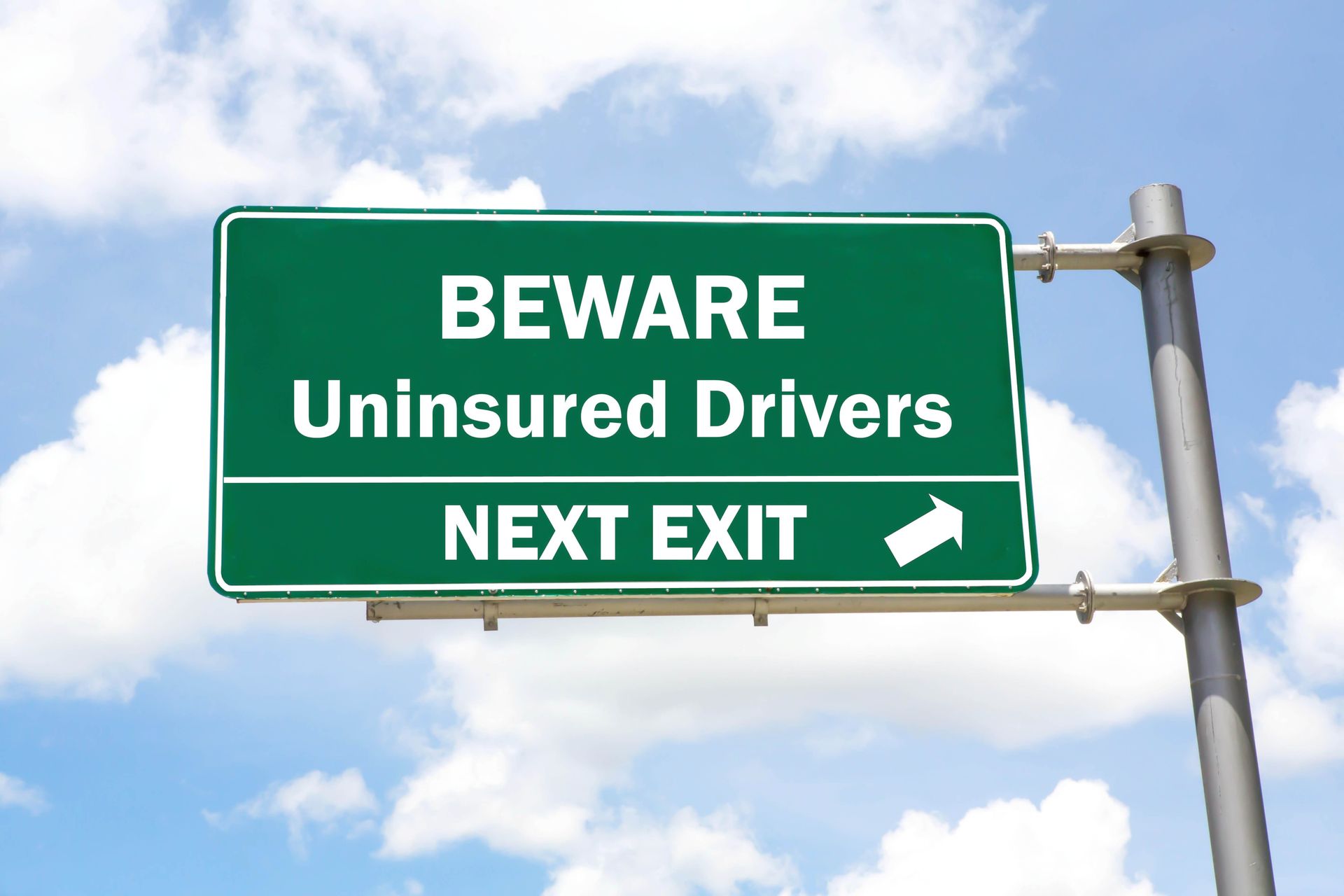
The vast and busy roadways of Texas highlight the critical importance of Uninsured/Underinsured Motorist (UM/UIM) coverage for drivers and cyclists. This type of insurance plays a pivotal role in providing financial protection against accidents involving uninsured or inadequately insured drivers.
High Proportion of Uninsured Drivers
In 2022, an estimated 13.8% of Texas drivers were uninsured, placing Texas 22nd in the nation for the number of uninsured drivers. This statistic alone underscores a significant risk that every Texas motorist faces. The likelihood of encountering an uninsured driver on Texas roads is not just a possibility but a relatively common occurrence.
Role of UM/UIM Coverage
UM/UIM coverage is not a luxury but a necessity in such an environment. It safeguards you against both uninsured drivers and situations where the responsible party's insurance is insufficient. This coverage becomes particularly crucial in cases where the at-fault driver's insurance is unable to fully cover your damages or medical expenses resulting from the accident.
State Insurance Minimums May Be Insufficient
While Texas mandates minimum liability limits (30/60/25), these might be inadequate in severe accidents, especially those involving uninsured drivers. The state-required limits provide $30,000 for bodily injury per person, $60,000 total for bodily injury per accident, and $25,000 for property damage. However, given the high medical costs and potential for extensive property damage, these minimums often fall short in serious collisions.
Proactive Steps for Texas Drivers and Cyclists:
- Regularly review your insurance policy to ensure that it includes UM/UIM coverage. Consider the risks unique to Texas roads and adjust your coverage accordingly.
- Be aware that while UM/UIM coverage is optional, the relatively high rate of uninsured drivers in Texas makes it a prudent choice for added financial security.
- Engage with insurance professionals to understand how UM/UIM coverage complements your existing policy, ensuring a more comprehensive protection plan.
Given Texas' ranking and the inherent risks on its roadways, opting for UM/UIM coverage is a strategic decision for safeguarding against the economic consequences of an accident with an uninsured or underinsured driver.
State Bicycle Laws in Texas
In Texas, cyclists are subject to the same rights as motorists since bicycles are classified as vehicles (Tex. Transp. Code Ann. §§541.201(23); 551.101). This gives cyclists identical rights and duties, though there are additional rules tailored specifically for biking.
Alongside practicing safe cycling, cyclists must be well-informed about these specific laws to navigate the roads safely and legally.
- Safe Passing Laws: While there's no specified safe distance law, motorists overtaking bicycles must do so on the left at a safe distance, ensuring they check blind spots.
- Helmet Law: There's no statewide helmet requirement in Texas, leaving helmet use to personal choice unless a local ordinance dictates otherwise. Nonetheless, Texas promotes bicycle helmet usage during Child Safety Month.
- Vulnerable Road User Laws: Texas doesn't define 'vulnerable road user' by law but does enforce enhanced penalties for motorists causing harm to cyclists in crosswalks.
- Distracted Driving Laws: There are stringent restrictions on wireless communication device usage for drivers under 18, motorcycle or moped operators under 17, drivers of passenger buses carrying minors, and all drivers within school crossing zones unless using a hands-free device.
- Where to Ride: Cyclists should ride as close as practicable to the right curb or edge of the roadway unless passing, turning left, encountering road conditions that prevent safe riding to the right, or when the lane is too narrow for a bicycle and a motor vehicle to travel side by side.
- Sidewalk Riding: Texas does not specifically address the legality of riding a bicycle on the sidewalk, leaving it to local jurisdictions to regulate.
- Mandatory Use of Separated Facilities: Cyclists in Texas are not mandated to use any lane or path other than normal vehicular traffic lanes.
- Nighttime Riders: A bicycle at night must be equipped with both a headlamp and either a red reflector or a lamp that emits a red light visible from a distance of 500 feet to the rear of the bike.
- Bicycling Under the Influence: The definition of motor vehicles in Texas includes bicycles for intoxication offenses, implying that bicyclists should not ride under the influence.
- “Idaho Stop” and Vehicle Detection Errors: Texas does not allow bicyclists to treat a stop sign as yield signs, known as the "Idaho Stop," nor to disregard traffic lights that fail to detect bicycles.
- Authorization for Local Regulation of Bicycles: Local authorities in Texas can regulate the operation of bicycles, require registration and licensing, and restrict practices that may be annoying to others on streets and sidewalks.
- Dooring law: The law requires that vehicle doors should not be opened on the side of moving traffic unless it can be done safely and without obstructing traffic.
Basically, Texas bicycle laws require bicyclists to follow the same traffic rules as motor vehicles, including stopping at stop signs and yielding to pedestrians.
However, it's essential to familiarize yourself with the traffic laws and local support regulations in Texas to ensure you're adequately prepared and protected. Such knowledge is crucial for safely navigating the legal intricacies and advocating for your rights as a cyclist.
State Advocacy Groups in Texas

Texas is home to a range of advocacy groups dedicated to advancing the interests of cyclists, working tirelessly to improve conditions for cycling and safeguarding cyclists' rights.
Key players include,
- Bike Texas, focuses on legislative advocacy, education, and collaboration to make cycling safe and accessible.
- The Texas Bicycle Coalition is another force, advocating for road safety and promoting cycling as a healthy and eco-friendly mode of transportation.
These organizations are instrumental in driving change, from local infrastructure projects to state-wide policy reform. Their commitment ensures that the voice of the cycling community is heard, and their efforts make Texas roads safer for everyone.
Additionally, for legal advocacy, there are specialized resources for cyclists, especially pertinent in the wake of accidents. This legal support is crucial for navigating cyclists' rights and ensuring just outcomes in the complex landscape of Texas law.
Major City Advocacy Groups in Texas
In Texas's major cities, local advocacy groups play a pivotal role in promoting cyclist safety and rights. These city-specific organizations address unique urban cycling challenges, pushing for improvements in infrastructure and policy.
- Austin: In the state's capital, Bike Austin is a prominent group. It focuses on making Austin's streets safer for cyclists through active engagement in policy-making and community-building events.
- Houston: BikeHouston leads the charge in Houston, advocating for better biking infrastructure and safer roads. They work closely with city officials to ensure cycling considerations are a priority in urban planning.
- Dallas: In Dallas, the cycling scene is supported by the initiatives of BikeDFW. This organization is committed to advocating for cycling as a practical and sustainable transport option in the Dallas-Fort Worth region.
These groups understand the intricacies of their respective cities and work tirelessly to make urban cycling a safer and more enjoyable experience. By tackling issues specific to their cities, they ensure that the needs of local cyclists are met and their voices heard.
What to Do If You've Been Involved in a Cycling Accident in Texas?
If you’re involved in a bicycle accident in Texas, there are several important steps you should take:
- Call for Emergency Services: The absolute first thing you should do is take stock of your well-being and call 9-1-1 if you're hurt. If you’re able to, move yourself and your bicycle to a safe area off the road. This helps prevent any additional accidents or serious injuries.
- Exchange and Collect Information: It’s important to collect the driver’s information including their name, contact, insurance details, and vehicle identification number (VIN).
- Document the Accident: From the moment of the accident, start to gather evidence from the scene. Take photos, note down witness contact information, and keep a detailed record of your medical treatment and related expenses.
- Wait for Authorities: Stay at the scene until the police arrive. It's important to have official police reports, especially if the accident involves substantial damage or injury.
- Avoid Negotiations at the Scene: Limit your communication with the other party involved in the accident to the exchange of essential information. Avoid discussing fault or making agreements about the accident, as these statements could be used in legal proceedings.
Why You Need a Texas Bicycle Accident Attorney?
Navigating a bicycle accident case in Texas calls for specialized legal representation. Here are key reasons why having a bicycle accident attorney is essential:
- Comprehensive Understanding of Cycling Laws: A Bike injury lawyer brings a deep understanding of Texas cycling laws, vital for correctly interpreting situations specific to bicycle accidents. Their knowledge is especially beneficial for injured cyclists seeking justice.
- Expertise in Settlement Negotiations: A bicycle accident lawyer is an expert at negotiating settlements, ensuring fair financial compensation for clients, crucial for the best outcomes in both court and settlement discussions.
- Experience with Insurance Companies: Familiarity with the workings of an insurance company equips bike accident lawyers with the ability to efficiently navigate complex claims processes, ensuring that your rights are effectively protected.
- Ability to Assess Long-Term Impacts: Experienced bike accident attorneys are adept at evaluating the long-term consequences of injuries, factoring in aspects like lost wages and loss of consortium. They work to ensure that settlements comprehensively address future medical needs, financial losses, and the overall impact of the accident on your personal and professional life.

Key takeaways
- Know the Laws: Familiarize yourself with Texas cycling laws, including helmet use, road-sharing norms, and specific regulations in different cities.
- Understand the Benefits: Recognize the advantages of cycling in Texas, such as diverse scenic routes, active communities, and environmental benefits.
- Be Aware of Challenges: Acknowledge the potential difficulties faced by cyclists in Texas, like heavy traffic and varied road conditions.
- Stay Informed on Accident Stats: Keep updated with the latest bicycle accident statistics in Texas to understand risk factors and safety concerns.
- Check Safety Rankings: Look at where Texas stands in national cycling safety rankings to gauge overall safety and areas for improvement.
- Identify Safe Cities: Note which Texas cities are ranked safer for cyclists, focusing on their cycling infrastructure and policies.
- Consider UM/UIM Coverage: Understand the importance of Uninsured/Underinsured Motorist coverage in Texas, especially given the number of uninsured drivers.
- Follow State-Specific Laws: Pay attention to detailed Texas bicycle laws, such as safe passing laws and requirements for nighttime riding.
- Engage with Advocacy Groups: Participate in or follow the efforts of cycling advocacy groups in Texas for better cycling conditions and rights.
- Know Post-Accident Actions: Learn the critical steps to take if involved in a cycling accident, including documentation and contacting authorities.
- Value of Legal Assistance: Recognize the importance of having a specialized bicycle accident attorney for legal guidance and support.
For those involved in cycling accidents, finding the right legal representation is crucial. Bike Legal is your best bicycle accident attorney in Texas, ensuring that you have access to an experienced professional who specializes in bicycle accident cases. Their tailored expertise is exactly what you need in these challenging situations.
Request a free consultation by calling 877-BIKE LEGAL (877 245-3534) or submitting a form.

